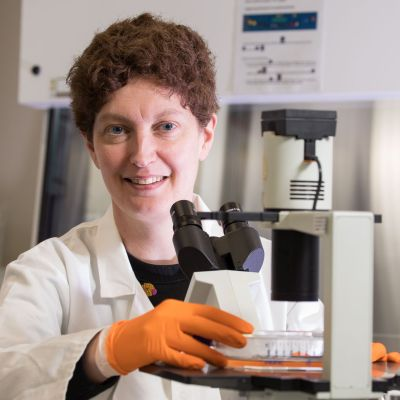DIPG Heroes Clinical Trial Fund
We are co-funding the UK's FIRST clinical trial using CAR-T cell therapy for children with DIPG/DMG. We want to provide families with access to more progressive treatment opportunities at home in the UK.
Our campaign is now complete. 31 supporters helped us raise £20,144.00
Visit the charity's profileWe are co-funding the UK's FIRST clinical trial using CAR-T cell therapy for children with DIPG/DMG. We want to provide families with access to more progressive treatment opportunities at home in the UK.
Closed 09/10/2024
The UK has seriously lacked new, novel, innovative approaches, and any effective treatments for children's DIPG brain cancer for far too long. Ideally Abbie's Army would like to see a range of clinical therapies available to newly diagnosed children, and other trial entry levels that include combinations of targeted agents and modalities - 'higher risk and high reward' strategies.
Recently developments in the United States have seen the introduction of immuno-therapeutic CAR-T cell strategies for DIPG disease. Recruiting trials are open in various US centres Seattle (B7-H3) and Stanford (GD2) are examples. Understandably these have been a cause of great interest to ourselves and families alike.
We have been progressing this treatment with the leading CAR-T program team in the UK for some time. We intend to bring this forward as a treatment option and clinical trial for 12 patients in the UK late 2022. The trial will take place at Great Ormond Street Hospital, London.
The development of this treatment approach has identified a marker or 'antigen' IL13-RA2 (Interleukin 13 Receptor Subunit Alpha 2) a protein coding gene on the outside of DIPG tumour cells that is absent on healthy cells; this allows the building of a CAR (chimeric antigen receptor) which tells the T-cells to recognise that marker on a cancer cell.
* Tracking to the DIPG tumour antigen marker IL13-RA2 - designated as "A2R72 CAR-T cells.
* Priming of the DIPG tumour micro-environment to make the treatment more effective . DIPG's surround themselves in an immunosuppressive environment, a genetic module will make T cells resistant to these conditions.
* Additional module for 'cytokine IL-15' production that maintains CAR longevity in the body
* A 'suicide switch' so that if necessary the effects of the CAR can be turned 'off'

These are powerful immunotherapies and experiments in pre-clinical research in the lab have shown that engineered T-cells can kill DIPG cells from tumour biopsies. There is some experience using CAR-T cell therapy in children here with neuroblastoma and leukaemia. (Previous donations to Abbie's Army contributed to the development and research at Stanford University, bringing a GD2 directed CAR-T immunotherapy option to trial in the United States)
Understandably the technology and the level of patient support required means this will an expensive clinical study, and the largest grant award that Abbie's Army has ever made. We need to raise as much as we possibly can to support further development of the CAR-T cell program which will form the basis of ALL treatments for future patients.
As this will be the UK's first EVER 'in-child' study of this treatment approach in DIPG we also need to work out which dose of CAR T-cells we can safely give. Secondly, we will need to work out if the cells best reach the tumour if we give them into the vein (IV) or directly into the fluid around the brain called the CSF and this trial will provide options for both approaches. Patients will require intense monitoring and regular MRI scans to assess the effect of the CAR T-cells on the DIPG tumour.
The CAR-T field for DIPG/DMG is a very collaborative field and results in all trials using all targets shall be monitored. If there is evidence that validates a shift to another target antigen this also will be considered.
Abbie's Army is a UK designated research charity for DIPG, formed to bridge the clear unmet need for pre-clinical and clinical research into the fatal children's brain cancer DIPG (Diffuse Intrinsic Pontine Glioma) We specifically support or commission targeted research to help find a cure for DIPG. We welcome the opportunity to work with other fundraising groups and charities to ensure progress comes faster and is collaborative.
Visit the Abbie's Army website
(Texts cost £10 plus one standard rate message and you'll be opting in to hear more about our work and fundraising via telephone and SMS. If you'd like to give £10 but do not wish to receive marketing communications, text DIPGHERONOINFO to 70085)
Charities pay a small fee for our service. Learn more about fees